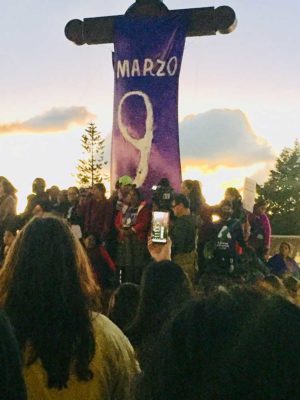 Last year, I attended International Women’s Day in San Cristobal, Chiapas, Mexico. Earlier that week, I’d been visiting midwives in a village a couple of hours away, but on this Sunday, I decided to stay in the city. I’d been searching various websites, looking for information about IWD, pretty certain that in a city this size, there’d be some sort of gathering to recognize the day. I couldn’t find a thing though —nothing, no announcements or plans anywhere.
Last year, I attended International Women’s Day in San Cristobal, Chiapas, Mexico. Earlier that week, I’d been visiting midwives in a village a couple of hours away, but on this Sunday, I decided to stay in the city. I’d been searching various websites, looking for information about IWD, pretty certain that in a city this size, there’d be some sort of gathering to recognize the day. I couldn’t find a thing though —nothing, no announcements or plans anywhere.
My translator spoke for me with a local woman who explained that no information would be available publicly — word would be spread directly, privately — mujere a mujere, woman to woman. Apparently, it’s just too risky to advertise such events. Sometimes rabble rousers are hired to attend public gatherings in order to wreck havoc (or worse), and then local organizers can be blamed and held to account for anything that goes wrong.
It turned out that there would be a gathering quite close to my hotel. I bundled up and headed out, no idea of what I might find. Nearby, Peace Square was about three quarters filled with people, mostly women, a few men and children. Most of the families appeared to be Indigenous people, their textiles and crafts neatly laid out on blankets, around the perimeter of the Square. As they were every day, they were focused on the task at hand — selling their goods.
I edged my way closer into the centre of things, a foreigner if anyone was to look closely at me, but no one seemed to care about that. I was a woman, I was welcome no matter my skin colour. There was a bonfire off to one side, with lots of chanting and yelling going on. A strong feeling of angst was tangible in the early evening air, blending in with the billows of dark smoke. I mingled in the crowd, feeling safe but troubled by the meaning of the nearby fire. I asked around a bit and eventually found someone who spoke English. She explained the bonfire was being used to burn an effigy of AMLO— Andrés Manuel López Obrador — President of Mexico. Elected democratically in 2018, this supposedly progressive president, commonly known as AMLO, had initially brought great hope for change to the people of Mexico. Mexicans had been jarred recently by several barbaric murders, including the slaying and skinning of 25-year-old Ingrid Escamilla, and the killing of Fátima Cecilia Aldrighett Antón, a 7-year-old who’d been abducted from her school. There’d been an initial belief that AMLO would take action to address the growing rate of femicide (women killed based on their gender) within Mexico. But people’s hopes had been dashed yet again, amid increasing frustration with his lack of attention to the issue. I chatted with a number of young female activists in the crowd as I moved about, encountering in them all a disturbing mix of anger and despair. Dressed in purple, the colour of International Women’s Day, many waved banners declaring “We are the voice of those who are no longer with us.”
As darkness fell, women gathered around the huge wooden cross which stands permanently in the centre of Peace Square. It was draped with a banner proclaiming “Fight today so we don’t die tomorrow.” There were women who stood alone, lost in their own thoughts. Others were crying on each other’s shoulders, while many simply huddled in small groups, standing together in the solidarity of their pain and loss. Most held candles high in the night air, filling the sky with an eerie glow.
It was all a very disturbing experience for me—unlike anything I’d ever participated in before. I wasn’t even sure I could honestly say that I’d even truly “participated.”
But a year later, I am writing this story to share what I saw and learned from the women at the 2020 International Women’s Day in San Cristobal de Casas, Mexico. It’s a very small, almost invisible part – but for me, it’s yet another strong connection to the women of Mexico. Now I can hope that their message ripples outward from here.


Saint Mary’s Church, Westmeath — Deanery of the Northwest